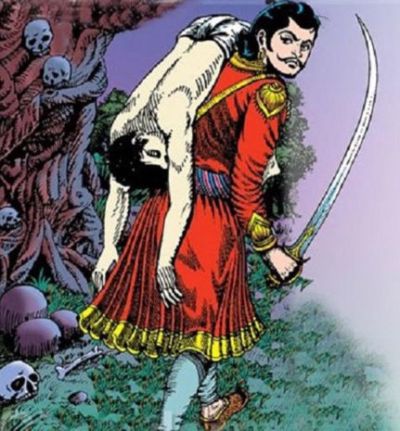Read the previous part here…
She somehow climbed up onto the ledge, her arms and legs bruised badly, and started to walk back home. Crying all the way, asking passersby for directions, she finally reached her fathers house.
“My dear! What happened to you?” exclaimed her horrified father as she walked through the door.

मुषिताः स्म पथि स्तेनैर् नीतो बद्ध्वा च मत्पतिः ।
वृद्धा मृता निपत्यापि श्वभ्रे नाहं मृता पुनः ॥ १२,१०.३३ ॥
अथागतेन केनापि पथिकेन कृपालुना ।
उद्धृताहं ततः श्वभ्रात् प्राप्तास्मीह च दैवतः ॥ १२,१०.३४ ॥
एवम् उक्तवती मात्रा पित्रा चाश्वासिता ततः ।
भर्तृचित्तैव सा तस्थौ तत्र रत्नावली सती ॥ १२,१०.३५ ॥
याति काले च तद्भर्ता स स्वदेशगतः पुनः ।
द्यूतक्षपिततद्वित्तो दनदत्तो व्यचिन्तयत् ॥ १२,१०.३६ ॥
Ratnāvalī replied “We were stopped on our way through a deep forest, and robbed by the thieves who had hidden there. My husband was bound and taken away, and the old lady and me were pushed into a deep ravine. She died, but I somehow survived through the grace of Ishvara. I was helped by some passers-by and am here now…”And she started to cry.
Her parents comforted her and asked her to take rest. Their minds were filled with concern for their son-in-law, and they hoped that he would be freed soon.
In the course of time, Dhanadatta, who had gone back to gambling in a big way, lost all the money that he had looted from his wife. He thought to himself “Let me go back and try to extract some more money from my father-in-law…I will tell him that his daughter was not feeling well and hence could not make the trip…”
आनयामि पुनर् गत्वा मार्गित्वा श्वशुराद् धनम् ।
गृहे स्थिता मे त्वत् पुत्रीत्य् अभिधास्ये च तत्र तम् ॥ १२,१०.३७ ॥
एवं स हृदये ध्यात्वा प्रायाच् छ्वशुरवेश्म तत् ।
प्राप्तं च तत्र तं दूरात् स्वभार्या पश्यति स्म सा ॥ १२,१०.३८ ॥
धावित्वा चापतत् तस्य सा पापस्यापि पादयोः ।
दुष्टे ऽपि पत्यौ साध्वीनां नान्यथावृत्तिमानसम् ॥ १२,१०.३९ ॥
भीताय च ततस् तस्मै तद् अशेषं न्यवेदयत् ।
यन् मृषा चौरपातादि पित्रोः प्राग् वर्णितं तया ॥ १२,१०.४० ॥
ततस् तया समं तत्र निर्भयः श्वाशुरे गृहे ।
प्रविष्टः श्वशुराभ्यां स हर्षाद् दृष्ट्वाभ्यनन्द्यत ॥ १२,१०.४१ ॥
दिष्ट्या जीवन्न् अयं मुक्तश् चौरैर् इति महोत्सवः ।
तेन तच्छ्वशुरेणाथ चक्रे मिलितबन्धुना ॥ १२,१०.४२ ॥
ततः स धनदत्तो ऽत्र भुञ्जानः श्वशुरश्रियम् ।
रत्नावल्या तया साकम् आसीत् पत्न्या यथासुखम् ॥ १२,१०.४३ ॥
एकदा तत्र रात्रौ च स नृशंसश् चकार यत् ।
कथोपरोधतः शान्तम् अवाच्यम् अपि कथ्यते ॥ १२,१०.४४ ॥
हत्वाङ्कसुप्तां भार्यां तां तदाभरणसंचयम् ।
अपहृत्य ततः प्रायात् स स्वदेशम् अलक्षितः ॥ १२,१०.४५ ॥
Dhanadatta then set out once again to meet his father-in-law. As he drew near the house, Ratnāvalī spotted him from a distance, and rushed out of the gate, and fell at that wicked man’s feet.
Even though a husband is cruel, the feelings of a good wife do not change.
Dhanadatta got frightened, thinking that everyone would come to know of what he had done. Ratnāvalī however, told him about the fictitious story that she had told her parents, and comforted him that they did not know the truth. Dhanadatta now gained the courage to enter the house of his in-laws, who welcomed him joyfully and enquired about his well-being.
In the evening, his father-in-law held a great feast for the village, celebrating that his son-in-law had managed to escape and reach back unharmed.
For a few days, Dhanadatta lived happily with his wife and her family, enjoying their hospitality and their money.
But what he did next is too shameful to narrate, but I will have to say this, so that the story continue.
One night, he murdered his wife in her sleep, took away all her ornaments and money, and fled back to his city.
That is why I say that men are wicked and ungrateful”, concluded Somikā…
to be continued…
